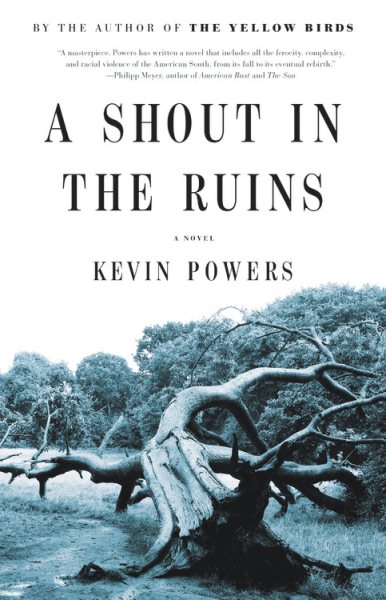By Guy Stricklin. Special to the Clarion-Ledger Sunday print edition (May 27)
 In his daring second novel, A Shout in the Ruins, Kevin Powers—author of The Yellow Birds—looks piercingly at the American South whose savage history he carefully traces in places like Richmond’s Chimborazo Hospital and through characters “lined with mark after mark of whip and brine.”
In his daring second novel, A Shout in the Ruins, Kevin Powers—author of The Yellow Birds—looks piercingly at the American South whose savage history he carefully traces in places like Richmond’s Chimborazo Hospital and through characters “lined with mark after mark of whip and brine.”
Powers’ sprawling cast moves in and out of focus during a story that crisscrosses the antebellum South and its ensuing century of violence and upheaval. The story opens onto three characters each uniquely confronting a rapidly changing and wholly indifferent world: Emily Reid, the unloved and unloving daughter born in Chesterfield County in 1847; her father’s slave, Rawls, whose docked toes cannot keep his melancholic soul from wandering; and 93-year-old George Seldom, a widower losing his home in Richmond to the impending construction of the interstate highway in 1956.
Their individual lives are knit together along with numerous others in a narrative broken up by digressions of memory and shifting points of view. This dynamic approach allows motifs and whole scenes to resurface countless times. We watch houses burning, embers, ashes, bleached bones found in the ruins, a world on fire, and a world collapsed. A Shout in the Ruins is reminiscent of another recent multi-generational novel, The Son by Philipp Meyer, whose praise for Powers is quoted on this book’s jacket.
As the novel unfolds, Powers depicts the variety of ways violence—emotional, as well as physical—is enacted and endured by these characters. George’s pain is shapeless, systemic, and reflective; Rawls’ expansive, without border, hereditary; and Emily’s private, deep, a cave whose hollowing darkness she cannot or will not plumb. Pain, though, is pain and you read on hoping salvation of a kind finds its way, though it will have to be as varied as the characters themselves.
Powers writes with a sharpness that is both convincing and convicting. This is a book rooted in a South we know. The violent rending of a nation and the unspeakable cruelty of slavery reverberate throughout, but Powers moves beyond these very real acts and takes on a perspective which sees even those seminal events as echos of some more ancient transgression. Meditation might strike closest to what this novel aims toward. Quite quickly, Powers is examining not only his characters but the whole of humanity. In passages evoking Kubrick’s 2001, he describes the order of the world as repetition: violences repeated, passed down, and given to each successive generation from the very start. “The gun goes off when the line gets crossed, and the line got crossed a long time ago, when we were naked and wandered the savanna and slept beneath the baobab trees” writes Powers. Violence, as he tells it, is both personal and cosmic; intimate and elemental.
And yet throughout, punctuating this darkness, are flickers of love and goodness and kindness: a baby rescued, help given, hope trusted, and good done in spite of its seeming uselessness, its transience, and its insignificance. As with many of his characters, Powers is asking us to consider that perhaps, in spite of all the world’s violence and pain, in spite of everything, “One good thing still counts.”
A masterful novel, Kevin Power’s A Shout in the Ruins is a timely powerhouse full of seething violence and remarkable humanity.
Guy Stricklin is a bookseller and the First Editions Club supervisor here at Lemuria.
Kevin Powers’ novel A Shout in the Ruins is Lemuria’s May 2018 selection for our First Editions Club for Fiction.


Comments are closed.